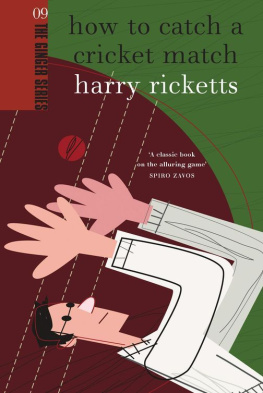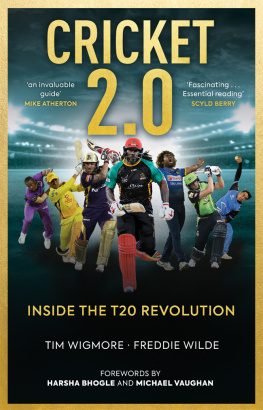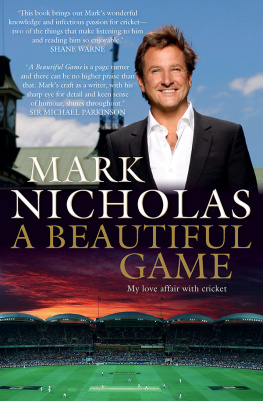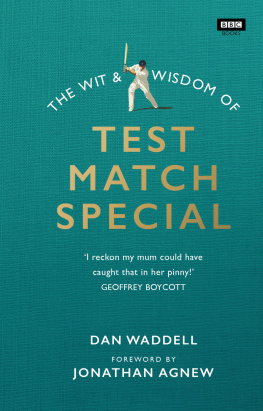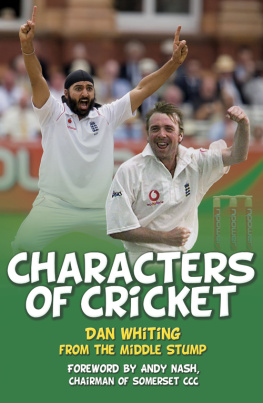CMJ

First published in Great Britain by Simon & Schuster UK Ltd, 2012
A CBS Company
Copyright 2012 by Christopher Martin-Jenkins
This book is copyright under the Berne Convention.
No reproduction without permission.
All rights reserved.
The right of Christopher Martin-Jenkins to be identified as the author of this work has been asserted by him in accordance with sections 77 and 78 of the Copyright, Designs and Patents Act, 1988.
Simon & Schuster UK Ltd
1st Floor
222 Grays Inn Road
London
WC1X 8HB
www.simonandschuster.co.uk
Simon & Schuster Australia,
Sydney
Simon & Schuster India, New Delhi
All pictures supplied courtesy of the author
A CIP catalogue for this book is available
from the British Library.
ISBN: 978-0-85720-082-2
eBook ISBN: 978-0-85720-083-9
Typeset by Hewer Text UK Ltd, Edinburgh
Printed and bound by CPI Group (UK) Ltd, Croydon, CR0 4YY
To our children, James, Robin and Lucy, who have given me so much pleasure; and to their children, Molly, William, Freddie, Missy, George, and any still to come.
CONTENTS
1
SUMMERS LEASE
The Kennington Oval, south London; I am watching professional cricket for only the second time. In the 1950s it is still a smutty place, brown brick a bounding, a working-class playground if ever there was one, where early F.A. Cup finals were played. Cloth caps are the prevailing fashion on the wooden seats where my young brother and I sit uncomfortably, the sun like a hot blanket bearing down on us through a heavy sky the colour of pale lead, though it is August in a heat-wave. The youthful Ken Barrington, looking small in the green middle distance, albeit with the chunky build of a middleweight boxer, lifts a bat guided by white-gloved hands and brings it sharply down on a ball pitched outside his off stump. With amazing speed the hard red ball skims precisely towards us on the boundarys edge. All the way, all the way, says a wizened old watcher to our left, pleased to see a late cut executed with such mastery by so inexperienced a batsman. The white fence in front of us absorbs the impact and it drops to the grass, close enough to touch. I so want to pick it up and throw it back. Sore bottom or not, I am already besotted with the game.
The Oval again on 23 August 2009, sun still shining down, this time from a bluer sky on a brighter afternoon at a ground now developed for business executives; as much glass, steel and plastic as brick these days. Thousands watching in the ground but millions listening on the radio, to me for some reason! Michael Hussey, all angular style and nose-to-the-earth determination, heroic in defeat for Australia, gets an inside edge onto his pad off Graeme Swanns off-break. Alastair Cook envelops the ball at chest height at short-leg and little umpire Asad Raufs finger is raised towards the sky. England have won the Ashes.
That does not happen very often. To be on the air to describe the moment is a special privilege and it felt almost as exciting to me in 2009 as it had thirty-two years earlier, in 1977, when Rod Marsh, like Hussey raging against the imminence of defeat during a defiant innings, skied a drive off Mike Hendrick towards Derek Randall at wide mid-off. Randalls were the surest hands (and the swiftest feet) in the England team. He circled below the descending red blur, held the ball securely in both hands, threw it high in the air and, keen schoolboy in an adult shell that he always was, turned a cartwheel that signified a nations joy.
All this I described as best I could in the instant of its happening, before uttering (subconsciously aware, even in 1977, of the contemporary need for soundbites), the magical words: And England have won the Ashes.
There is a civilised tradition that allows a home commentator to describe the moment of victory, be he English or Australian. I have given way to a few in my time, from the silver-voiced Alan McGilvray to the laconic Jim Maxwell. In 2009 Jonathan Agnew, the BBCs bright and industrious correspondent, on the air when Englands eighteen-year drought ended in a welter of patriotic fervour four years previously, had left the box to be the first to interview Andrew Strauss. To my amazement he bobbed up in the middle with a microphone in hand, scarcely more than a minute after Hussey had been caught, to give listeners the first breathless reactions of the 2009 summers ultimate hero.
Emails had poured in to Test Match Special from all quarters of the globe, including Mozambique, Ghana, South Georgia and the base camp at Everest. Somehow people had found ways to listen to the radio commentary. Five or six million was the estimated audience. For an objective commentator there should not even be reflected glory at moments like this but it is hard not to rejoice within. It would be boring, after all, if the same nation were always the top dog.
The pleasure has been all the greater on those even rarer occasions when England have claimed the urn in Australia itself during my forty years and more of writing and talking about cricket for a living, not least when Strauss and his team enjoyed an even greater triumph early in 2011. Three innings wins for England on that trip lifted the spirits of millions during a cold, grey winter in Britain. There is something special about being there to record victories won in foreign lands, particularly unexpected ones. I think of Derek Underwood bowling Gary Sobers as the West Indies collapsed against spin bowling at Port of Spain in 1974; of Steve Harmison blazing his way through the West Indies at Sabina Park in 1994; the game at Karachi in 2000 when the winning runs were scored by Nasser Hussains side in almost pitch darkness; or the time in 2001 when the Sri Lankans, so hard to beat on their own pitches, collapsed like dominoes one stifling Saturday afternoon in Colombo.
It is the Ashes that resonate loudest. Having taken over from Brian Johnston in 1973 as the third of the four cricket correspondents so far appointed by the BBC, it fell to me to describe the moments when Bob Willis bowled Australias number eleven, Alan Hurst, at Adelaide in 1979 and, seven years later, when Merv Hughes swung a ball from Phil Edmonds into the waiting hands of Gladstone Small at deep square-leg at the Melbourne Cricket Ground. Through eighteen years of reporting for the Daily Telegraph and The Times there were no such good tidings to tell, but the 2010/11 series helped to erase from English memories at least the humiliation of losing all five Tests against Ricky Pontings great team four years previously. The emergence of England as the strongest team in Test cricket in 2011 when I was not only commentating but also, to my agreeable surprise, acting for a year as President of MCC, prompted the thought that I might have reached the autobiographical stage of life.
Cricket has been the central theme, although not the only one, since early boyhood. I can see myself now at the age of about eleven, sitting at a brown, ink-stained desk in the fusty form-room at my prep school in Eastbourne in early May, circa 1955, as a soft hum from outside the windows betrayed the mower, pushing its way up and down the playing field outside. At such times my thoughts inevitably drifted from whatever was being taught beside the blackboard. Mowing meant cricket then and, even in what might be called mature middle age, my nose still tends to twitch, like a deers on the wind, when it sniffs the beckoning scent of newly cut grass. In those relatively carefree days it used to lure as irresistibly as bread in the oven or the salty tang of the sea.



